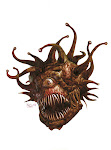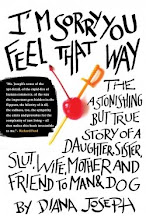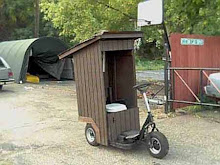[NOTE: The following analysis, like much of the extraneous work I do, is to-date incomplete. You have been warned.]
The first time I read "A Day in the Open"–—I’ll admit it, I had no idea what to make of the story. It tells about a day in the lives of two prostitutes, Julia and Inez. Over the course of twelve pages, Julia and Inez wake up; their pimp tells them to get ready; Señor Ramirez picks them up, and he drives them out to the country for a picnic. That is the story at in its briefest summation.
A cursory reading might leave you confused, helpless to understand, much like reading Joy Williams for the first time. Thus, the miracle of close-reading. Read the opening paragraph:
In the outskirts of the capital there was a low white house, very much like
the other houses around it. The street on which it stood was not paved, as this
was a poor section of the city. The door of this particular house, very new and
studded with nails, was bolted inside and out. A large room, furnished with some
modern chromium chairs, a bar, and an electric record machine, opened onto the
empty patio. A fat little Indian boy was seated in one of the chairs, listening
to the tume Good Night, Sweetheart, which he had just chosen. It was playing at
full volume and the little boy was staring very seriously ahead of him at the
machine. This was one of the houses owned and run by Señor Kurten, who was half
Spanish and half German.
The narrator tells us all we need to know about the setting: a low white house like the other houses around it, in the outskirts of the capital, on an unpaved street. The house is low-profile; it blends in, skirts around the center of power, policy, government, control, etc. The unpaved street suffices to make clear the poverty–—the narrator’s open reminder of this fact serves to emphasize the poverty.
The house is easily overlooked, yet the narrator moves in closer, caught, if you will, by the door, ‘very new and studded with nails...bolted inside and out.’ Why a new door? Why studded with nails? For what reasons would the owner of this house keep people from coming in or going out? The narrator takes us closer still, inside the house: ‘A large room...chromium chairs, a bar, an electric record machine, opened onto an empty patio.’ Such furniture as chromium chairs would be expensive and rather hard to break. The bar, record player, and patio suggest that parties occur in this house; people come here to drink and to dance–—if they can get inside, like an exclusive club. Then we see the first character: A fat little Indian boy, seated in one of the chairs, listening to Good Night, Sweetheart at full volume. He is ‘staring very seriously ahead of him at the machine.’
The boy is the only character in the room. Obviously he does not belong there. Who does he belong to though? Is he fascinated by the electric record machine by merit of its novelty? Or is it the song that holds him rapt? I don’t really know, nor do I think it matters: I don’t need to know. The house, its location, the door bolted inside and out, the room with the bar, the chairs, all of this implies a deeper, if not darker subtext. If the title of the story can be of any help by this point, it is helping us realize some irony is at play.
So then what do we make of the last sentence of the opening paragraph? ‘This was one of the houses owned and run by Señor Kurten, who was half Spanish and half German.’ Señor (Spanish) Kurten (German). One house, of many very much like it. Owned: the house is property. Run: the house is a business. What sort of business would Señor Kurten run in an inconspicuous house that is bolted inside and out?
The details tell us "whorehouse" or "brothel". But again, I’ll admit, I did not pick up on this the first time through. The details glided past under my eyes, but they kept me reading. Further along, the characters behave so strangely, and are described in such unusual terms, that I had no choice but to continue reading the story:
It was a gray afternoon. In one of the bedrooms Julia and Inez had just
awakened. Julia was small and monkey-like. She was appealing only because of her
extraordinarily large and luminous eyes. Inez was tall and high-breasted. Her
head was a bit too small for her body and her eyes were too close together. She
wore her hair in stiff waves.
Julia was moaning on her bed.
"My stomach is
worse today," she said to Inez. "Come over and feel it. The lump on the right
side is bigger." She twisted her head on the pillow and sighed. Inez was staring
sternly into space.
"No," she said to Julia. "I cannot bear to feel that
lump. Santa María! With something like that inside me I should go wild." She
made a wry face and shuddered.
"You must not feel it if you do not want to,"
said Julia drowsily. Inez poured herself some guaro. She was a heavy drinker but
her vitality remained unimpaired, although her skin often broke out in pimples.
She ate violet lozenges to cover the smell of liquor on her breath and often
popped six or seven of them into her mouth at once. Being full of enterprise she
often made more money outside the whorehouse than she did at her regular
job.
Julia was Mexican and a great favorite with the men, who enjoyed feeling
that they were endangering her very life by going to bed with her.
What do these details tell us? 1: Julia and Inez are getting up in the afternoon. 2: Julia appears quite fragile and delicate, almost innocent enough to seem like a baby; but no, she is not that innocent, more an object of pity, so she is like a monkey instead (it is easier to hurt a monkey than it is to hurt a baby). 3: Inez has an unsettling, alien appearance, the way her face and head are described; that she is ‘high-breasted’ suggests that she has not had any children. 3: Julia is either truly ill or she merely believes she is ill; she has some sort of ‘lump’ on her stomach. 4: Inez finds Julia’s lump repugnant, repellant, perhaps disgusting; ‘staring sternly into space’ implies she is thinking about this while Julia asks to come feel the lump. 5: Julia will not force Inez to feel the lump. 6: Inez drinks habitually, perhaps for coping; pimples would make her a bit less attractive than she already was; her attempts to hide her drinking make it even more evident; her regular job is in fact at the whorehouse, but she does something outside the whorehouse (we don’t know exactly what) in order to earn more money, which implies secrecy on Inez’s part.
The brief final paragraph above, about Julia, says quite a lot about her (considering information revealed later in the scene). She is not one to ‘refuse anyone anything’. The men like her so much because they can do things to her that perhaps other prostitutes (such as Inez) would never allow. The frailty of Julia’s appearance seems to reinforce the idea: ‘small and monkey-like.’ The men (read: johns) see her as less a human and more an animal. Easier to hurt a monkey than a baby, as I said.
Note also the repetition that Bowles uses. In the paragraph about Inez’s habits, the word ‘often’ appears three times. The initial physical descriptions of Julia and Inez are reported; the tone is passive, statement-of-fact. Different characters are staring forward in a similar manner. As the two women share a bedroom (physical space), they share space in paragraphs, over and over again. They are crowded together, dialogue-and-action, into paragraphs, as if neither can even have their own textual space.
.....




No comments:
Post a Comment